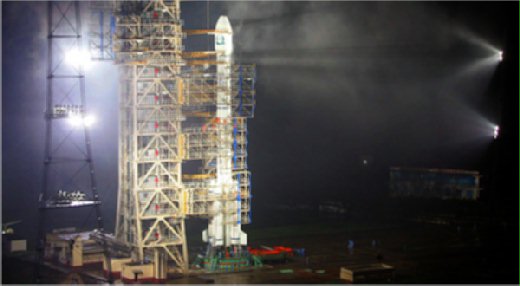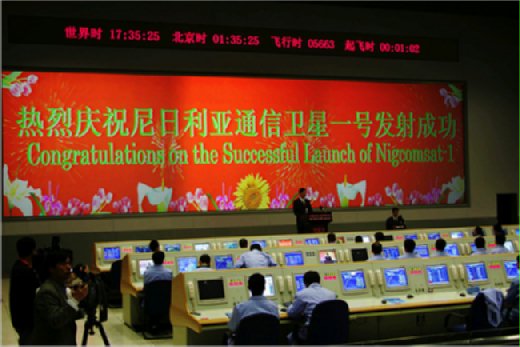中文翻譯綜合中央社與星島環球網上的翻譯;台灣翻成奈及利亞,對岸翻成尼日利亞;圖為衛星今年5月14日在四川西昌發射的場景
Snubbed by U.S., China Finds New Space Partners
By JIM YARDLEY
BEIJING, May 23 — For years, China has chafed at efforts by the United States to exclude it from full membership in the world’s elite space club. So lately China seems to have hit on a solution: create a new club.
Beijing is trying to position itself as a space benefactor to the developing world — the same countries, in some cases, whose natural resources China covets here on earth. The latest and most prominent example came last week when China launched a communications satellite for Nigeria, a major oil producer, in a project that serves as a tidy case study of how space has become another arena where China is trying to exert its soft power.
Not only did China design, build and launch the satellite for Nigeria, but it also provided a huge loan to help pay the bill. China has also signed a satellite contract with another big oil supplier, Venezuela. It is developing an earth observation satellite system with Bangladesh, Indonesia, Iran, Mongolia, Pakistan, Peru and Thailand. And it has organized a satellite association in Asia.
“China is starting to market and sell this technology to developing countries that need it,” said 沈丁立, a professor in international relations at 復旦大學 in Shanghai. Of the Nigeria deal, Mr. 沈 added: “It gives substance to Sino-African relations. Not only does China buy raw materials, but also we sell some things.”
For China, the strategy is a blend of self-interest, broader diplomacy and, from a business standpoint, an effective way to break into the satellite market. Satellites have become status symbols and technological necessities for many countries that want an ownership stake in the digital world dominated by the West, analysts say.
“There’s clearly a sense that countries like Nigeria want to have a stronger presence in space,” said Peter J. Brown, a journalist who specializes in satellite technology and writes frequently about the satellite market in Asia. “As you look around the map, more and more countries are moving to get satellites up.”
China’s more grandiose space goals, which include building a Mars probe and, eventually, putting an astronaut on the moon, are based on an American blueprint in which space exploration enhances national prestige and advances technological development. But Beijing also is focused on competing in the $100 billion commercial satellite industry.
In recent years, China has managed to attract customers with its less expensive satellite launching services. Yet it had never demonstrated the technical expertise to compete for international contracts to build satellites.
The Nigeria deal has changed that. Chinese engineers designed and constructed the geostationary communications satellite, called the Nigcomsat-1. A state-owned aerospace company, Great Wall Industry Corporation, will monitor the satellite from a ground station in northwestern China. It will also train Nigerian engineers to operate a tracking station in Abuja, their national capital.
Last week, a day after the launching, Ahmed Rufai, the Nigerian project manager for the satellite, was exultant as he paused between appointments at his Beijing hotel. Nigeria may be rich in oil, he said, but it lacks many of the basic building blocks of a modern, information-based economy.
“We want to be part of the digital economy,” Mr. Rufai said, noting that Africa suffers more than any other continent from the so-called digital divide. “We are trying to diversify the economic base of the country.”
Mr. Rufai predicted that the satellite would pay for itself within seven years as Nigeria sold bandwidth to commercial users. But he also predicted major improvements for Nigeria itself: “distance learning” educational programs for remote rural areas; online public access to government records; a video monitoring system of remote oil pipelines to allow quicker responses to spills; and an online banking system.
Nigeria is a risky customer for any satellite manufacturer. It is consistently rated one of the most corrupt nations, and at least one Western aerospace company has become embroiled in business disputes there. “Business ventures with Nigeria have been difficult, to say the least,” said Roger Rusch, president of TelAstra, a satellite communications consulting firm in California.
Nigeria put the project out for bidding in April 2004. Mr. Rufai said that 21 bids had arrived from major aerospace companies but that nearly all of them failed to meet a key requirement: a significant financial package.
Mr. Rufai said the Western companies saw Nigeria as a major gamble. “Their response was very cool,” he said of one financial institution approached about backing the deal. “They said, ‘Oh, Nigeria. Don’t touch it.’ ”
China was not so cautious. With the satellite priced at roughly $300 million, the state-owned Export-Import Bank of China, or China ExIm, granted $200 million in preferential buyer’s credits to Nigeria. The bank often provides the hard currency for China’s soft power aspirations: In Africa, China ExIm has handed out more than $7 billion in loans in recent years, according to one study.
“They were the only ones who stated in concrete terms that they would be able to support the project,” Mr. Rufai said. Quality remained a concern. Last year, China suffered a major setback with the failure of the Sinosat-2. It was the most sophisticated satellite ever made in China, and it suffered a systems breakdown on its first launching. The Nigerian satellite was delayed for three months so that it could be retrofitted.
Joan Johnson-Freese, chairwoman of the Department of National Security Studies at the Naval War College, said China still trailed major aerospace companies in the quality and sophistication of its satellites, which is one reason it is marketing to developing countries. But, she added, the strategy was working on multiple levels.
“They want to play a leadership role for developing countries that want to get into space,” Dr. Johnson-Freese said in an interview earlier this year. “It’s just such a win-win for them. They are making political connections, it helps them with oil deals and they bring in hard currency to feed back into their own program to make them even more commercially competitive.”
Satellites also are becoming vital to Beijing’s domestic development plans. In the next several years, China could launch as many as 100 satellites to help deliver television to rural areas, create a digital navigational network, facilitate scientific research and improve mapping and weather monitoring. Research centers on microsatellites have opened in Beijing, Shanghai and Harbin, and a new launching center is under construction in 海南 Province.
But China’s focus on satellites has also brought suspicions, particularly from the United States, since most satellites are “dual use” technologies, capable of civilian and military applications. Currently, China is overhauling its military in a modernization drive focused, in part, on developing the capacity to fight a “high tech” war.
Analysts say China’s determination to develop its own equivalent to the Global Positioning System, or G.P.S., is partly because such a system would be critical for military operations if a war were to erupt over Taiwan.
Most alarmingly to Western countries, China conducted an antisatellite test in January by firing a missile into space, destroying one of its own orbiting satellites and scattering a trail of dangerous debris despite its oft-stated opposition to the use of weapons in space. Four months later, Washington is still trying to parse China’s motivations, while China has offered little explanation.
Space relations between the powers were already frosty. Washington, responding to scandals over stolen technology, has tried for nearly a decade to isolate the Chinese space program through export restrictions that prohibit the use of American space technology on satellites launched in China. Washington also has prevented China from participating in the International Space Station and, in some cases, stopped Chinese scientists from attending space conferences in America.
Michael D. Griffin, NASA’s administrator, did signal a thaw in relations when he visited China last fall. But critics say the American strategy has backfired. A recent critique of the Bush administration’s space policy blamed Washington for alienating space allies with a “go it alone” philosophy. It also blamed the export restrictions for damaging American competitiveness and helping foreign competitors like China gain an advantage in the commercial market.
China, meanwhile, eyes the United States warily. Earlier this year, Eric Hagt, director of the China program for the World Security Institute, testified in Washington that China’s increasing investment in space has made it feel more vulnerable at a time when the United States is advocating missile defense programs in the name of protecting against terrorist states.
China believes the United States is determined to dominate space, even as China’s own national interests are increasingly tied to space, Mr. Hagt said. “The United States needs to come to grips with the reality that China will demand more ‘strategic room’ in space,” he told the federal U.S.-China Economic and Security Review Commission.
The United States is also realizing that many parts of the world are happy to give China that space. When the Nigerian satellite was launched, the blastoff was televised live to Nigeria, the Chinese news media reported. Nigerian newspapers proclaimed the satellite as a seminal moment in the country’s efforts to modernize its economy.
Mr. Rufai, the Nigerian project manager, said he was certain that other developing countries had noticed how China had designed, built, launched and financed the satellite.
“It’s a model that people will try to replicate,” he said.
多年來,中國對美國阻撓它成為世界精英太空俱樂部的做法感到惱火。因此,最近,中國似乎偶然發現了一個解決辦法:成立新的俱樂部。
北京正試圖把自己定位成發展中國家的太空贊助人——在某些情況下,中國覬覦這些國家在地球上的自然資源。最新最引人注目的例子就是上周中國為尼日利亞發射一枚通訊衛星,這個項目是研究太空如何變成中國施展軟實力的又一舞臺的一個適當例子。
中國不僅為石油豐富的尼日利亞設計、製造並發射衛星,它還提供大量貸款幫忙支付帳單。中國還和另一個重要石油供應國委內瑞拉簽署衛星合同。它和孟加拉、印尼、伊朗、蒙古、巴基斯坦、秘魯和泰國開發一個地球觀測衛星系統。而且它已經在亞洲組織了一個衛星協會。
報導引述上海復旦大學國際關係教授沈丁立(音譯)說,「中國開始銷售和販賣技術給有需要的發展中國家」,他還補充說,「中國跟奈國的交易,增加了中國與非洲的實質關係,中國不只購買原物料,也出售一些東西」。
對中國而言,這個戰略融合了自我利益、廣泛外交,而且從商業角度來看,這是打入衛星市場的有效方式。對許多希望在西方主導的數字世界取得股份的國家而言,衛星已經變成身份的象徵和技術必需品。
專門從事衛星技術研究、經常撰寫有關亞洲衛星市場文章的記者布朗指出,諸如奈國這樣的國家,都想在太空領域中擁有更大的影響地位,而環顧全世界,越來越多國家正逐漸朝向取得衛星科技的道路前進。
更宏偉的中國太空目標包括建造火星探測器並最終把宇航員送上月球,這是基於太空探索提升國家威望和推動科技發展的藍圖。但北京還把精力放在一千億美元商業衛星產業的競爭上。
近年來,中國設法用較低廉的衛星發射服務吸引顧客。然而它過去從沒展示出爭奪造衛星的國際合同的技術專長。
尼日利亞那宗業務改變了這種狀況。中國工程師設計並建造了這顆同步通訊衛星尼日利亞通信衛星一號(Nigcomsat-1)。中國國有航太公司中國長城工業將在中國西北的地面站檢測該衛星。它還將培訓尼日利亞工程師操作位於尼日利亞首都阿布賈的跟蹤站。
對任何衛星製造商來說,尼日利亞都是一個危險的客戶。它一貫是世界上最腐敗的國家之一,而且至少有一家西方航太公司已經捲入那裏的商業糾紛。
中國則不是那麼謹慎。衛星價格大約為三億美元,國有中國進出口銀行批了兩億美元的優惠買方信貸給尼日利亞。該銀行常常為中國的軟實力熱望提供硬貨幣:最近的調查發現,在非洲,中國進出口銀行在最近幾年已經派出超過七十億美元的貸款。
質量仍然是一個關切。去年,鑫諾2號的失敗讓中國遭遇重大挫折。這是中國製造的最尖端的衛星,在首次發射時遭遇系統故障。尼日利亞衛星推遲了三個月以便改進。
美國海軍軍事學院國家安全決策部主任弗里斯(Joan Johnson.Freese)認為,中國衛星在質量和精良方面仍然落後於大型航太公司,但其戰略是多層面的。他在今年年初的訪問中表示,“他們想扮演那些想進入太空的發展中國家的領袖角色。”“這對他們而言是雙贏的。他們在發展政治聯繫,這有助於他們的石油交易,而且他們掙得的硬貨幣反饋到他們自己的項目,讓他們更具有商業競爭力。”
衛星對北京的國內發展計畫也極其重要,在未來幾十年,中國可能發射多達一百枚衛星幫助封閉的農村地區輸送電視信號,建立數位導航網路,推動科學研究和改善測繪和氣候監測。
但中國對衛星的關注也引來了猜疑,尤其是美國的,因為多數衛星技術有“雙重應用”,可作民用也可作軍用。
紐約時報這篇報導最後指出,美國也已意識到,世界許多國家都樂意給中國這樣的空間。根據中國媒體報導,奈國現場實況轉播了上週發射衛星的情形,奈及利亞也把這枚衛星發射比擬為奈國邁向經濟現代化的重大時刻。


 字體:小 中 大
字體:小 中 大










